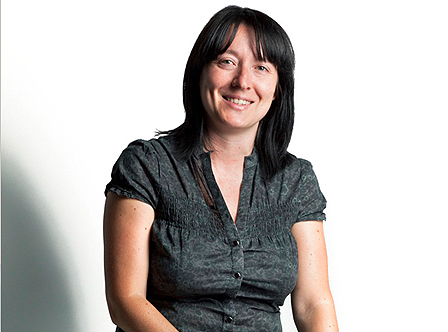INTERVIEW

From the helm of "La mecánica del caracol", the science popularisation programme she directs on Radio Euskadi [radio channel of the Basque Autonomous Community’s broadcasting authority], Eva Caballero has managed to set the standard for information on science and technology for the general public. In this interview, Caballero insists that "we have to communicate to society that investments in science and technology are vital for our future".
1.- Your programme spreads the work carried out by many organisations in the Basque Autonomous Community [region] in the field of science and technology. Why this commitment to scientific popularisation?
There are many reasons… For a start, it’s part of Radio Euskadi’s public service mission. The general interest media do not routinely and systematically devote part of their time to science and technology, and yet never have so many news items been produced on these matters. Having proven, accessible and first-hand information in this field in essential if you want to educate a discerning society that can distinguish between science and science fiction or pseudoscience. And also to explain that the work being done at the R&D centres is of use in extending the economic effort being made by the public institutions and the private organisations enabling these centres to exist. You have to know how to communicate to society that these investments are vital for our future.
2.- How can the media and journalists contribute towards educating society in the field of science?
The media have to act as the interface between scientific production and the public. To do this, it’s important to explain the concepts properly and make sure that a piece of information is not only handled on the basis of criteria and rigour but that it is also accessible for as many people as possible. But you mustn’t be tempted to simplify too much, either, or misinterpret aims or deadlines or mask reality to get a good story. Unfortunately, these misinterpretations often mislead the public and create mistrust among scientists.
3.- Do you think Basque society is aware of and recognises the effort being made by the administrations, companies and centres in their research activity?
I get the overall impression that a greater commitment has been made in the Basque Autonomous Community than in other regions to set up technology-based companies and research centres. But whether people really know what they do is another matter. In this respect, you need to make a constant effort to communicate the work they do.
4.- Popularisation is spreading to new formats, from radio to online activities. Are they contributing towards increasing popular interest in science and technology?
The Internet is playing a key role in spreading scientific knowledge. Firstly, because it encourages professionals in this field to disseminate their work and knowledge and secondly, because it’s a medium that the general public find easy to use. What is more, you can choose the degree of specialisation you want, from technical articles for professionals to content written in simple language to reach the greatest possible number of people. This second path is in fact the most natural one for the radio.
5.- In your programme you usually report from time to time on the projects and innovations being developed by IK4-TEKNIKER. How does the general public perceive the activity of this R&D centre?
I reckon the projects are rated positively because they are often to do with lines of research that have practical applications, which people find interesting. The key, once again, lies in providing the public with the possibility of getting interested in these subjects by using clear, simple language, by giving practical examples and by explaining the strategic importance of this work for the future of our society.



